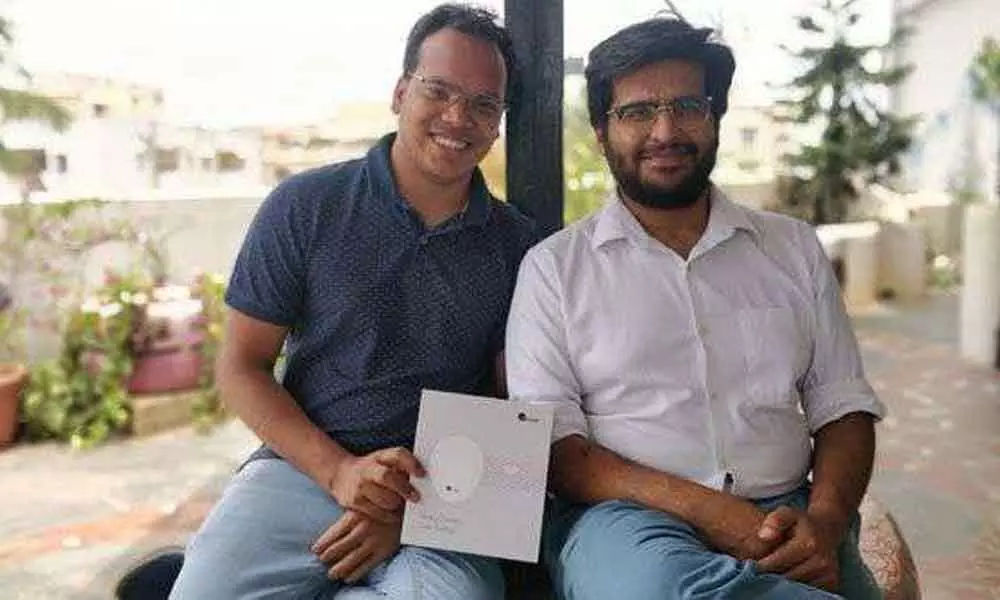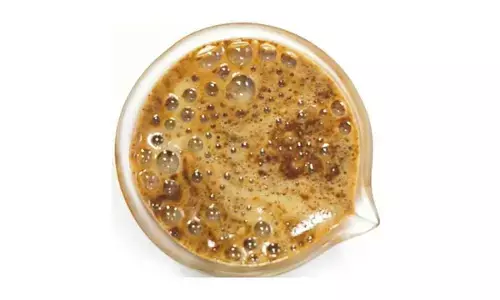IIT develops sensor sheets that detects heart disorders, stress
 Mudit Dandwate and Gaurav Parchani
Mudit Dandwate and Gaurav ParchaniA team of IIT graduates has developed an artificial intelligence (AI) powered sensor sheet that can be put under the mattress to detect indicators such as heart health, respiration, sleep, and stress with medical grade accuracy.
New Delhi : A team of IIT graduates has developed an artificial intelligence (AI) powered sensor sheet that can be put under the mattress to detect indicators such as heart health, respiration, sleep, and stress with medical grade accuracy.
The device works on a technology known as Ballistocardiography (BCG), which involves measurement of the movement of heart. BCG can be extended to find movement, breathing and snoring.
"Our advanced algorithms have been trained over billions of data points to achieve 98.4 per cent accuracy in measuring heartbeat and respiration.
The device is a contact-free health monitor and personal health companion," Mudit Dandwate, an alumnus of Indian Institute of Technology (IIT) Bombay, told PTI.
"It is a thin sensor sheet that goes below the mattress and tracks heart health, respiration, sleep, stress with medical grade accuracy. Basis tracking their health data, there are experts that provide personalised health improvement plan," said Mudit, co-founder of Dozee.
The device is powered by AI engine that conducts risk analysis on an individual's health data to note the slightest of deviations from their healthy baselines and detect any early signs of health deterioration.
The device has successfully predicted early health deterioration in conditions ranging from fever to heart failure, even before the symptoms appear, co-founder Gaurav Parchani, an alumnus of IIT Indore, told PTI.
The team noted that the thin sheet consists of micro-electromechanical system (MEMS) based vibro-acoustic sensors, and comes with data accumulation and communication unit, cloud software and mobile phone and web apps.
The Dozee sensor sheet when placed beneath the mattress under the chest of the user, captures micro-vibrations produced by the body every time the heart pumps blood, in addition to detecting inhalation, exhalation, muscle twitches, tremors or body movements, Parchani noted.
These signals are then precisely converted into bio-markers by sophisticated AI alogrithms. Biomarkers include heart rate, respiration rate, sleep stages (deep, light, REM, awake), apnea episodes, arrhythmia events, and heart rate variability, he said.
The information is then dissipated by the cloud servers to the mobile phone app and web-apps to give remote access to users, their caretakers, and their doctors, according to the team.
It also alerts users, caretakers and the doctors to set up custom alerts for conditions such as arrhythmia, apnea. Dozee works for all mattresses up to 18 inches in thickness and even with multiple people on the bed.
Parchani said unlike other fitness trackers or health monitors, Dozee allows users to measure health parameters with clinical precision. The team says the device does not need charging and is a cost-effective solution when compared to other medical devices.
Unlike wearables that have a high fall-out rate as the user has to wear it all the time, Dozee puts no such constraints on the user, Parchani noted.
Developed in collaboration with industry experts and institutions like National Institute of Mental Health and Neuro-Sciences (NIMHANS) and Jayadeva Institute of Medical Sciences in Bengaluru, Karnataka, Dozee has higher levels of accuracy than wearables and is as accurate as ECG and RIP bands, the team said.
The device also provides accurate insights over critical clinical conditions like sleep apnea and cardiac functions, it said.
"The device is built specifically for home settings, requires no technical expertise to set up and provides an effective remote monitoring service that enables high-skill medical staff to take decisions remotely," Parchani said.
"Specifically, we are seeing lot of adoption in elder-care, care for critical care patient, individuals who wish to manage lifestyle health conditions such as sleep apnea, heart failure etc," he said. The device has been priced at Rs 7,200, the team said.
Out of 57 million deaths each year, 40 million deaths are caused by non-communicable disorders, which can be managed by following healthy habits and monitoring of health as a preventive mechanism, according to the team.
A paper published in 2018 IEEE-EMBS Conference on Biomedical Engineering and Sciences (IECBES) proposed that the algorithm detects individual heart beats from BCG data with a higher detection rate as well as accuracy better than previously proposed techniques.
"The proposed algorithm is able to achieve an accuracy of 93.81 per cent for individual heart beats with a detection rate of 92.59 per cent, and an accuracy of 98.39 per cent for 30 second epochs with a detection rate of 99.46 per cent compared to a standard ECG machine," the authors, including Parchani, wrote in the paper.








